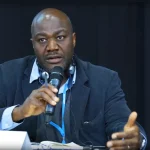Prof. Chukwumerije Okereke is the Director, Centre for Climate Change and Development, Alex Ekwueme Federal University, Ebonyi State and Coordinating Lead Author, United Nations Inter- governmental Panel on Climate Change (IPCC). He spoke to Property & Environment Editor, CHINEDUM UWAEGBULAM on Nigeria’s Nationally Determined Contribution and how to attain a low-carbon economy.
The strategic goal of Nigeria’s response to climate change is to foster low-carbon, high growth economic development path and build a climate resilient society. Have these objectives been achieved? What steps should be taken towards a low-carbon economy?
THIS is a good question. The government has taken a range of steps to foster low-carbon economy such as drafting an ambitious Nationally Determined Contribution (NDC), which commits Nigeria to reducing its carbon emissions by 20per cent by 2030 compared to 2010 baseline figures and 45per cent emission reduction conditional on international support.
However, I am afraid to say that the actual efforts on ground to drive green, climate-resilient sustainable growth in Nigeria are still too little. We are not on track to end glass flaring, which contributes over 58 million tons of carbon dioxide to the atmosphere and a significant proportion of Nigeria’s total greenhouse gas (GHG) emissions. In 2014, Nigeria flared 10.73 billion cubic meters (m3) of its associated gas production, or 12per cent of its gross production and ranked as the world’s fifth-largest gas flaring country, accounting for 8 per cent of the total amount flared globally in 2014. Meanwhile, over 70 per cent of the Nigerian households still use dirty traditional biomass for cooking. The government urgently needs big bold steps to signal a determination to drive a green economy transition in the country.
For me, the three most important steps Nigeria should take towards fostering a low-carbon economy are to urgently draft a national green growth plan, establish an inter-ministerial institution to drive the green growth agenda, and sign a climate change bill into law. My experience from studying and working with several governments around the world, including Rwanda, Ethiopia, the European Union, the United States, and the United Kingdom, among several others, is that one of the most important condition for fostering low-carbon economy in any country is a strong political will from the highest positions of power in the country.
Climate change is the biggest threat facing humanity today. It is evident in Nigeria through increases in temperature; variable rainfall; rise in sea level and flooding; drought and desertification; land degradation and loss of biodiversity. What should be the response of the government to these impacts?
You are right about the devastating and ever-increasing impact of climate change on several sectors of the Nigerian economy. The government’s own records suggest that Nigeria may already be losing between 2-11per cent of its Gross Domestic Product (GDP) per year to climate change impacts. It has been estimated that the 2012 flood caused Nigeria a total damage amounting to about N6 trillion, representing 1.4 per cent of real GDP growth in that year. Some models estimate that climate change may cost $460 billion by 2050. Nigeria may lose up to 50per cent of its agricultural yield to climate change by 2050 without concerted climate adaptation measures. We cannot afford to fold our hands and look.
Large proposition of the population, especially in the Niger Delta are coastal communities that may be wiped away with 0.7cm sea-level rise due to climate change. Several northern communities are vulnerable to flood and desertification and most of the states in the South East are challenged by climate change induced erosion and land degradation. I do not want to cause panic but I must warn that trillions of naira pension fund investment and assets may well be at risk to climate change. We cannot afford to be onlookers.
Governments needs to quickly draft a comprehensive national climate change adaptation plan with concrete action plan and programme to help the country respond to the menace of climate change. The closest Nigeria has come to having a national climate adaptation plan was way back in 2011 and there is an urgent need to update the document. A key part of such a plan has to be a robust Geographic Information System (GIS)-based vulnerability mapping to identify communities most at risk of climate related impacts as well as the identification of appropriate measures to enhance adaptation and resilience at local community levels.
Nigeria seems not to be on track to meet the Paris Agreement target, as energy-related carbon dioxide (CO2) emissions are growing due to increased fossil fuel consumption. Do you see renewable uptake, energy efficiency and energy access as key to the progress in that area? How?
I am afraid that you are right about the unlikelihood of our meeting our Paris commitment as contained in NDC document. We are not on track to achieving 2.5per cent improvement in energy efficiency per year and 20 per cent improvement by the end of 2020. We are not on track to providing 10 per cent of our total energy from renewable sources by 2025 or adding an additional 13,000 MW of renewable off-grid electricity to rural communities by 2030.
Instead, one sees an increasing number of high-polluting diesel generators in every nook and cranny of Nigerian cities. I have been making the point that one of the greatest opportunities that climate change presents to Nigeria is to address the dreadful and crippling problem of energy poverty in the country by driving a green energy revolution.
There are substantial potentials for the utilisation of solar thermal, wind turbine, small hydropower and bioenergy technology in the country, judging from a plethora of literature in the open domain. UNIDO once commissioned an off-grid 0.4 MW small hydropower plant in the Northern part of the country, which showed great promise. The opportunity in energy generation, employment creation, and industrial growth is huge.
I have absolutely no doubt in my mind that the uptake of modern renewable energy can be boosted in this country. However, we need a smart, ambitious and well-coordinated plan. We need the right mix of policy signal and incentives coupled with investment in technologies, innovation and the human resource development.
The World Bank estimated that Nigeria and others in sub-Saharan Africa would contribute largely to 143 million climate migrants by 2050. What should the federal and state authorities do to forestall environmental migration?
The number is terrifying. The point of this figure is that climate change poses far-reaching human and national security challenges to Nigeria and other African countries. It is important to note that climate-induced migration can create tensions in destination areas, which can in turn result in conflict and war. The dynamic is that large-scale population movements can lead to sudden scarcity of resources and services in areas that previously had surplus. And when conditions of scarcity occur due to either increased consumption or environmental degradation, competition inevitably ensues among users of the scarce resources. Fierce competition could lead to competing claims and conflict among rival user groups. Unresolved conflict in a timely and friendly manner may result in violence. Once a state of violence occurs, people fleeing areas of violence may create new demands for resources elsewhere.
In this manner, states of violence acts as a negative feedback mechanism on resource scarcity that further exacerbate competition and conflict for scarce resources. The remedy is not to wait until things get out of hand. The government needs to put in place both climate mitigation, adaptation measures to ensure the preservation of human security and forestall the massive, uncontrolled as well as unsustainable migration as a result of climate change and the negative chain reaction that such forced migration will cause.
With a promise of 20 per cent unconditional emission reduction and 45 per cent conditional emissions by 2030 compared to 2010 baseline scenario, Nigeria’s Nationally Determined Contribution (NDC) appears to be ambitious. Do you think the country’s NDC is achievable or realistic? What are the obstacles in curbing Nigeria’s greenhouse gas emissions?
As previously mentioned, Nigeria is not on track to achieving these targets. I honestly don’t think that those targets were realistic. This is why I am delighted to lead a national project funded by the World Resources Institute to inject rigorous analysis and involve the Nigerian public in the revision of the NDC due for submission by the end of this year. I think Nigerians have the duty to work with the Department of Climate Change and the international experts to ensure that the goal and targets set in the revised NDC are not only ambitious but also realistic.
Crucially, we need to make sure that government has a clear intention and concrete plan to implement the commitment made. We should move beyond saying things to make us look good to the outside world, but think hard about how to align our climate change action with the broader objective of growing our industries, creating jobs, addressing unemployment and fostering a high growth climate resilient green economy.
Experts say the absence of national emission registry, containing emissions from most of the key sectors (energy, transport, and forestry) has made the NDC look like a guess projection. Do you share this opinion?
What should the Federal Government incorporate or adjust in its NDC revision process?
Yes, it is true that some of the numbers are guesstimates and it is vital to invest recourses in getting the numbers right. However, for me the more important challenge is to ensure that we have a clear plan for leveraging the global momentum for green economy transition and the vast international climate finance to protect our planet, build a sustainable low-carbon economy that delivers green jobs, and makes the society more equal and more prosperous for all. This is the task for national leadership and the task to which I am devoted to championing in the interest of present and future generations.
https://guardian.ng/property/environment/nigeria-should-urgently-draft-a-national-green-growth-plan/






